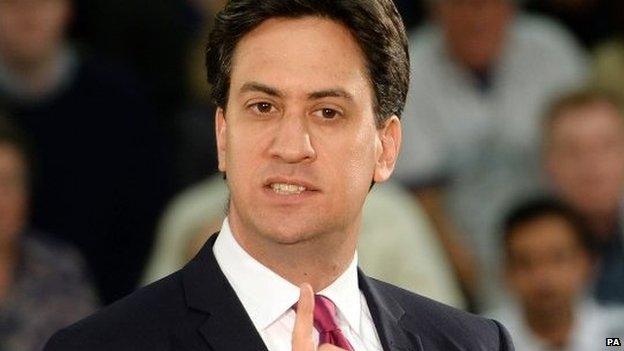Scottish Independence: How will Labour deal No vote fallout?
- Published

The slogan of the anti-independence campaign was "No thanks doesn't mean no change".
But Labour may face rather more change than it imagined.
To convince voters in Scotland to back a No vote, more powers for the Scottish Parliament - over tax and welfare - were agreed, and a swift timetable for implementation hastily drawn up.
But with Labour in opposition at Westminster, it may face calls to make concessions if even draft legislation is to be introduced to a truncated timetable.
Some backbench Conservative MPs believe that in return for more powers for the Scottish Parliament, MPs from Scotland should have less power at Westminster - particularly over voting on matters that are devolved to Edinburgh.
Andrew Hawkins from the polling company ComRes believes voters in England would take a similar view. "The sight of Scottish MPs traipsing through the lobbies and voting on issues which don't affect Scotland, but which do affect people who they are not representing, is an anathema to a lot of voters," he says. "It is one of the reasons why we see the rise of parties like UKIP."
'Very difficult'
All this matters because restricted voting rights for Scottish MPs, as has now been proposed by David Cameron in his response to the referendum, could undermine a future Labour government.
Mr Hawkins says: "The latest polling that we have done suggests that, while Labour would be on course for an overall majority under the present system, if you remove Scottish MPs from the equation it would fail to win a majority.
"So if Labour MPs are excluded from voting on issues that MPs from the rest of the UK would vote on, that is going to make it very difficult for a Labour prime minister to get his or her legislative programme through."

John Denham believes English Labour should get a distinctive voice
And the prospect of more powers for Scotland is opening up a debate within Labour about whether a more distinctly English voice needs to be heard.
Former minister John Denham represents a Southampton constituency - almost as far from his party's Scottish heartlands as it's possible to travel in the UK. He believes the time for the creation of an English Labour Party has come.
"The Labour Party is not structured to have a voice for England," he says. "So whilst the Welsh and Scottish Labour Parties are parts of UK Labour, they clearly have their leadership there. They have their own parliamentarians. They have their own conferences. They have their own policies, which very often is not made with any reference to the rest of the UK Labour Party at all.
"England doesn't have any equivalent, so the very powerful English voices, particularly in local government, in the regions - in the south of England, every bit as much as the north of England or in London - have never fed into a structure that says 'This what Labour wants for England' and that's what we must now have and that's why I am calling for English Labour to be recognised."
And Mr Denham believes that English party should be permitted to voice a distinct agenda.
'Revenge'
But some in Labour argue there is a common lesson to be learnt both sides of the border from the referendum - that it was reasonably close means that Labour must campaign in 2015 as insurgents and not as part of the political establishment.
John McTernan was an adviser both to Tony Blair in Downing Street and former Scottish First Minister Henry McLeish.
"The Labour Party has lost arguments, lost votes in its core areas," he says. "That is not an issue only for Scotland. That's an issue for the UK as a whole.
"It's an issue where you see UKIP voters who were Labour voters just a few years ago in places like Rotherham or all the heartlands of the white working class are vulnerable and available to an insurgency from the right with UKIP in a way that they were vulnerable to an insurgency from the SNP. Labour has to take that seriously. Its urgent."
In Scotland he believes it's time to heal political wounds between Labour activists and supporters who backed independence.
Magnanimity?
But, as for the SNP itself, he wants it wounded further.
"There is a saying in the Australian Labour Party which is 'In defeat magnanimity and in victory revenge'.
"Think of what the SNP would do to Scottish Labour and do the opposite. They would say that if they won by a single vote, everything they said in their white paper had been endorsed, from the removal of Trident right through to tax cuts.
"Well, Labour has to do the opposite and say your policies were just rejected. Take the battle back and define every single bit of the defeat as defeat for the core elements of SNP."
So for some, talk of left re-alignment after a divisive referendum campaign is a diversion.
They would bury the hatchet. But it would be right in the heads of the SNP.